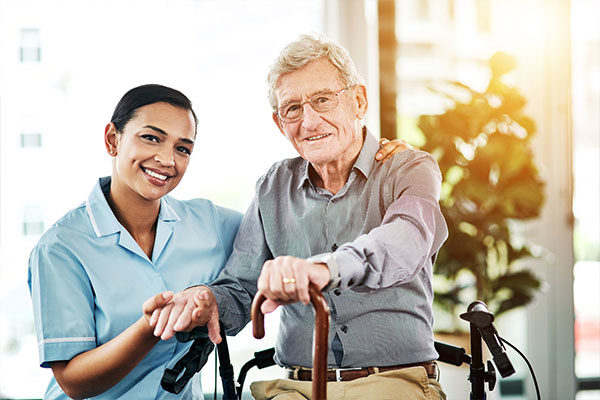 Our compassionate skilled nursing program helps those dealing with a decline in health or recovering from hospitalization. Each resident is cared for by a skilled interdisciplinary team comprised of nurses, social workers, dietitians, therapists, and recreational specialists—all overseen by an attending physician. Our goal is to return individuals to their highest level of independence while in the comfort of a safe and supportive environment.
Our compassionate skilled nursing program helps those dealing with a decline in health or recovering from hospitalization. Each resident is cared for by a skilled interdisciplinary team comprised of nurses, social workers, dietitians, therapists, and recreational specialists—all overseen by an attending physician. Our goal is to return individuals to their highest level of independence while in the comfort of a safe and supportive environment.
 Our rehabilitation programs strive to help our residents return to living their best life as quickly and safely as possible. We create an individualized plan based on needs and prior abilities. We listen and respect each resident’s choices at every stage.
Our rehabilitation programs strive to help our residents return to living their best life as quickly and safely as possible. We create an individualized plan based on needs and prior abilities. We listen and respect each resident’s choices at every stage.
- Physical: Physical therapists work to restore mobility and promote independence. The goal is to move the resident toward greater independence and mobility, either unassisted or with assist devices. Our licensed physical therapists focus on improvement, coordination, balance, strength, and endurance.
- Occupational: Occupational therapists use goal-directed activities to help restore, maintain, and improve daily living skills. The goal is to assess personal self-care and daily living skills and to provide modified techniques and/or adaptive devices, as necessary, to assist residents in achieving the level of skills needed in activities of daily living.
- Speech: Speech-language pathologists focus on improvements in swallowing, hearing, speech, and language proficiency. The goal is to assess and provide treatment for individuals with disorders of speech, language, swallowing, communication and/or feeding, and to help the resident recover lost skills or develop new ones.
- ACP Modalities including electrical stimulation. These “physical agent modalities” have been used successfully for many years to decrease pain, inflammation, and edema associated with a broad range of prevalent conditions. This proven medical technology also enables therapists to treat more complex conditions, decrease muscle disuse atrophy, enhance soft tissue healing through increased circulation, and improve neuromuscular control in residents with orthopedic and neurological diagnoses.
- Omnicycle, which is similar to an ordinary exercise cycle, but can be powered by the arms or legs. It also has a special motorized system that senses the amount of help needed to exercise. This allows those with physical limitations to participate in therapeutic exercise activities sooner after illness or injury.
- Rehab Transitions, our short-term rehab wing, offers all private rooms. Residents have three dining areas to choose from.
- Overnight resident accommodations are offered in Rehab Transitions.
- IV Therapy
- Real and Robotic Pet Therapy
- Recreation Therapy
- Stroke Recovery Rehabilitation
- Joint Replacement Therapy
- Exercise for all Abilities: One of our most popular activities is our Exercise for All Abilities class. Our group fitness activity utilizes a variety of techniques including a peloton-like bike experience, stretching, strength training, balance work, and cardio. Classes are led by our Director of Rehab along with our Activities Department, and Restorative Therapy, with a focus on having fun while meeting personal therapy goals.
 In our secured memory units, we provide expert and attentive care for those with varying degrees of dementia or Alzheimer’s. We provide a structured, comfortable, and nurturing environment that has routines in place to create a stress-free lifestyle, safety features to ensure the health of each resident, and programs designed to cultivate cognitive skills.
In our secured memory units, we provide expert and attentive care for those with varying degrees of dementia or Alzheimer’s. We provide a structured, comfortable, and nurturing environment that has routines in place to create a stress-free lifestyle, safety features to ensure the health of each resident, and programs designed to cultivate cognitive skills.
- Staffing expertise and regular training in Alzheimer’s/Dementia Care
- Innovative interventions (such as aromatherapy, robotic pets and dolls, and music therapy) to reduce sundowning, agitation, and the use of antipsychotic medications
- Freedom of movement without restraint
- Above-average staff to resident ratio
- 24/7 Access to multi-sensory (Snoezelen) room that provides a stimulating but calming space
- Specialized bowel and bladder programs
- Investment in memory care technology designed to stimulate brain function in areas of memory, attention, language, executive function, and visual/spatial acuity
